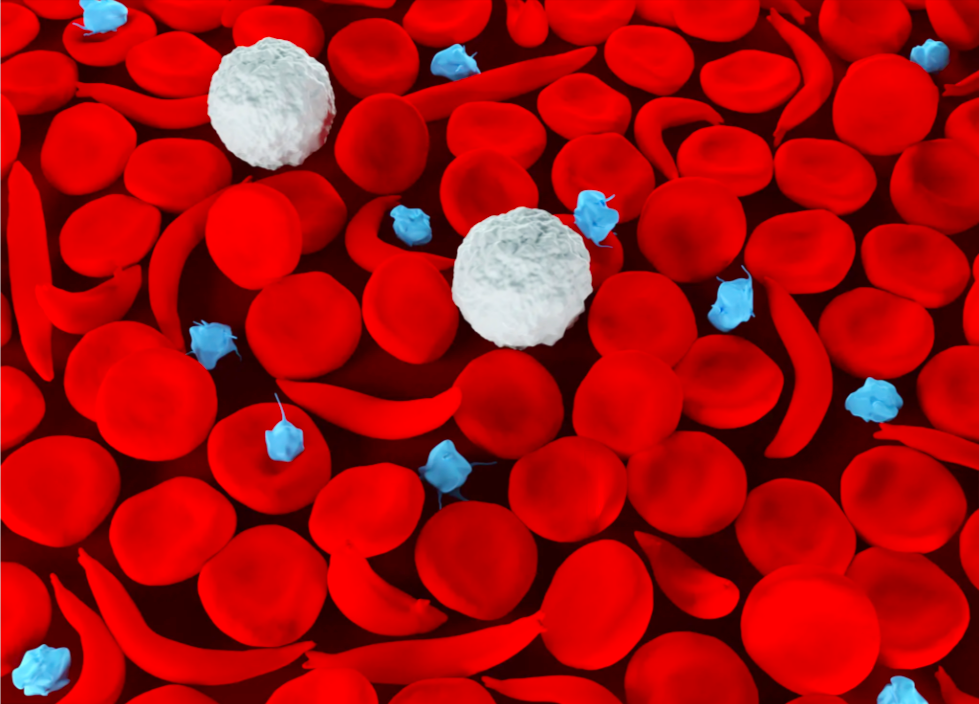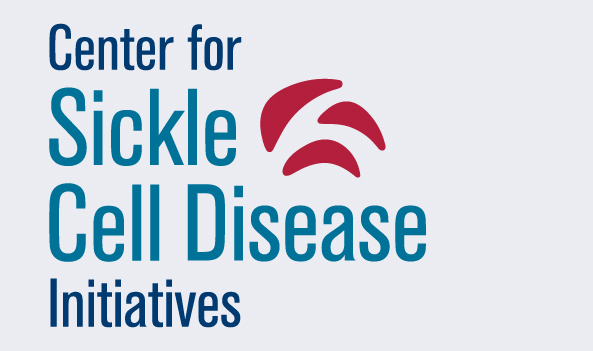Sickle Cell Disease
Approximately 70,000 to 100,000 Americans have sickle cell disease, the most common form of an inherited blood disorder. This disease, which is present in affected individuals at birth, causes the production of abnormal hemoglobin. Normally, the hemoglobin protein, which resides inside red blood cells, attaches to oxygen in the lungs and carries it to all parts of the body. Healthy red blood cells are flexible so that they can move through the smallest blood vessels. In sickle cell disease, the hemoglobin is abnormal, causing the red blood cells to be rigid and shaped like a "C" or sickle, the shape from which the disease takes its name. Sickle cells can get stuck and block blood flow, causing pain and infections.
Complications of sickle cell disease occur because the sickled cells block blood flow to specific organs. The worst complications include stroke, acute chest syndrome (a condition that lowers the level of oxygen in the blood), organ damage, other disabilities, and in some cases premature death.
In order for you or your child to inherit sickle cell disease, both parents must have either sickle cell disease (two sickle cell genes) or sickle cell trait (one sickle cell gene). There are variations of sickle cell disease called sickle C or sickle thalassemia, which are serious conditions but are sometimes less severe. If you have sickle cell disease, you will pass one sickle cell gene to your children.
Sickle Cell Trait
Sickle cell trait is an inherited blood disorder that affects approximately 8 percent of African-Americans. Unlike sickle cell disease, in which patients have two genes that cause the production of abnormal hemoglobin, individuals with sickle cell trait carry only one defective gene and typically live normal lives without health problems related to sickle cell. Rarely, extreme conditions such as severe dehydration and high-intensity physical activity can lead to serious health issues, including sudden death, in individuals with sickle cell trait.

Risk Factors
Sickle cell disease is more common in certain ethnic groups, including:
- People of African descent, including African-Americans (among whom 1 in 12 carries a sickle cell gene)
- Hispanic-Americans from Central and South America
- People of Middle Eastern, Asian, Indian, and Mediterranean descent
Because sickle cell disease symptoms can begin by four months of age, early diagnosis is critical. All newborns in the United States are now tested for the disease. Sickle cell disease can be identified before birth by testing a sample of amniotic fluid or tissue from the placenta. People who carry the sickle cell gene can seek genetic counseling before pregnancy to discuss options.
Signs and Symptoms
Signs and symptoms of sickle cell disease can be mild or severe enough to require frequent hospitalizations. They may include:
- Anemia (looking pale)
- Dark urine
- Yellow eyes
- Painful swelling of hands and feet
- Frequent pain episodes
- Stunted growth
- Stroke
Treatment
There are no standard treatments that cure sickle cell disease. However, there are treatments that help people manage and live with the disease. Treatment relieves pain, prevents infections, minimizes organ damage, and controls complications and can include medications, such as pain relievers and hydroxyurea (Hydrea), at times blood transfusions, and other options as needed.
Clinical trials provide access to experimental therapies for treating sickle cell disease. ASH provides information on clinical trials for which you may be eligible. Researchers are looking at new drugs and also exploring the use of bone marrow transplants to treat sickle cell disease. Stem cell transplants are associated with significant risks and are appropriate only for some patients with severe forms of sickle cell disease and closely matched donors such as a family member.
It is important for you to talk with your doctor if you believe you may have sickle cell disease. If you carry the sickle cell trait, make sure you tell your doctor before getting pregnant as well. Depending on your condition, your doctor may refer you to a hematologist, a doctor who specializes in blood conditions.
Advances in Sickle Cell Disease
Since researchers first identified sickle cell disease more than 100 years ago, numerous
advances have been made in the treatment and care of sickle cell patients.
View the SCD Milestone Timeline
Where Can I Find More Information?
If you are interested in learning more about blood diseases and disorders, here are a few resources that may be helpful.



